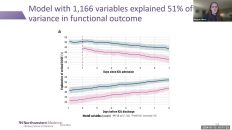Visit our website: http://bit.ly/2GtXaiw
Less Admin, More Patient Care: How AI & ML Technology Can Revitalize Physicians Days
Punit Soni, Co-Founder & CEO, Suki
Abstract:
It is clear that artificial intelligence (AI) and machine learning (ML) technologies are coming to health care. And while some of the hype around these technologies is justified, the potential value proposition of AI may not lie in the functions or roles that many would assume. The most valuable use cases for this technology right now, rather than diagnosing patients, delivering care, or replacing doctors, are instead supporting physicians by solving one of their biggest problems – the need for more time in their day. It’s true, technology has played a key role in demanding more of a physician’s time away from clinical practice. Today’s doctors face frustrating administrative and documentation burdens and difficult-to-use electronic health records (EHRs). On average, for every hour spent with a patient, physicians spend nearly two additional hours on medical paperwork. As the physician shortage continues to grow in the US, we cannot afford for this to continue. Physicians are losing hours in their day tending to administrative burdens like charting and note taking, which prevents them from doing what they got into medicine to do: care for patients. Instead of potential future use cases, technology developers must focus on the here-and-now and near-future ways in which AI can supplement and support doctors.
That is why building and rolling out AI and ML products that are designed directly around physicians everyday problems is essential. If the industry wants to make technology that finally makes doctors’ lives easier – unlike EHRs – products need to be built with a physician’s daily workflow in mind. Health care technology can provide solutions, that when integrated into daily workflows, address pressing physicians issues, make their lives easier, and, importantly, improve their care. Already, it’s clear that AI and ML can be leveraged to create products that make a real difference in the lives of physicians. For example, at Suki we have harnessed these technologies to create a voice enabled digital assistant for physicians that has already begun to demonstrate results – both in quantitative timed saved for doctors as well as stories of how relieved they are to have it.
Suki uses a combination of voice commands from a physician and context in which they are operating, to create a clinically accurate note that is then pushed to an electronic health record (EHR) system—enhancing the quality of care and creating greater efficiencies. Doctors who use Suki spend 50-70 percent less time on documentation. Over the course of a year, Suki has grown to 25 sites across 14 states and to help physicians in 18 medical specialties. As a result of this growth we’ve been able to measure successes on the practice and individual physician scale. One of the practices we work with has saved over 54,000 minutes, or on average one hour per doctor, per clinic day since we deployed Suki. The average time needed to take notes at this practice declined from 4.8 minutes per note to 1.6 minutes. Another family physician in Nashville previously spent 10 minutes in each patient’s chart, but when he started using Suki reduced that time to 2 minutes, 48 seconds. Following that progress, he found time to begin conducting more preventive care services for his patients – hopefully leading to improved quality metrics and health outcomes in the long term. In this session, we will highlight how AI and ML applications can directly address pressing physicians issues such as rising administrative demands, technology burdens, and professional burnout. At the end of this presentation, attendees will understand: Understand the burden of medical note taking and time spent in the EHR for physicians as well as what effects this has on patients and the broader health system. Recognize how AI and ML technology can have a role in lifting the administrative and technology burden physicians face. Evaluate how digital assistants can support physicians when designed to integrate into their daily workflows.”
How AI & ML Technology Can Revitalize Physicians Days: Less Admin, More Patient Care with Suki
November 20, 2019
4 views
4 min read
You may also like
Ai for Healthcare, Northwest Medicine Healthcare AI Forum
Northwestern Medicine Healthcare AI Forum — Feb 9, 2024
3 views
1 min read
Ai for Healthcare, Northwest Medicine Healthcare AI Forum
Northwestern Medicine Healthcare AI Forum — Jan 26, 2024
6 views
1 min read
Ai for Healthcare, Northwest Medicine Healthcare AI Forum
Northwestern Medicine Healthcare AI Forum — Jan 12, 2024
9 views
1 min read
Categories
- About AI
- Adobe
- AI
- AI ADVANTAGE TUTORIALS
- AI Art
- AI conferences
- Ai Engineer
- AI Explained
- Ai for Beginners
- AI for Daily Life
- AI for Developers
- AI for For Startups
- Ai for Healthcare
- AI in Popular Culture
- AI in Real Life by the BBC
- AI News
- AI Podcasts
- AI Science
- AI Technology
- AI Tools
- AI Use Cases
- Anthropic
- AWS
- ChatGPT Prompting
- Cold Fusion on AI
- Consumer Product Goods (CPG
- Creativity Squared
- Deep Dive into AI
- Dmitry Shapiro
- Eye On AI
- Featured AI Videos
- Foundational Models
- History of AI
- Introduction to AI
- Lex Fridman Podcasts on AI
- Microsoft
- MIT
- Natural Language Processing (NLP
- OpenAI
- Philosophy of AI
- Python
- Responsible AI
- Sequoia Capital AI Ascent
- Skill leap AI
- TED Talks
- The Ai Conference
- Thought Leaders
- University AI
- World Science Festival on AI
All Topics
- About AI255
- Adobe17
- AI135
- AI ADVANTAGE TUTORIALS169
- AI Art45
- AI conferences465
- Ai Engineer38
- AI Explained73
- Ai for Beginners23
- AI For Business15
- AI for Daily Life95
- AI for Developers118
- Ai for Education122
- AI for Family40
- AI for Fintech151
- AI for For Startups38
- Ai for Good28
- Ai for Healthcare113
- Ai for Kids12
- AI for Marketing36
- Ai for Parents6
- Ai for Teens27
- AI Hardware569
- AI in Popular Culture374
- AI in Popular Culture356
- AI in Real Life by the BBC26
- AI Law18
- AI Law & Compliance9
- AI News35
- AI PLATFORMS19
- AI Platforms24
- AI Podcasts197
- AI Science172
- AI Series by Centre for Eye Research14
- AI Smart Automation Conference12
- AI Summit London 202341
- AI Technology20
- AI Tools4
- Aidan Gomez – Cohere28
- Alex Karp – Palantir48
- Alexandr Wang34
- AMD7
- Andrew Ng48
- Anthropic6
- Artificial Intelligence & Machine Learning in Finance36
- Athens Roundtable on AI62
- AWS7
- BERT9
- BrXnd Marketing x AI17
- CALTECH18
- Cerbral Conference26
- Cerebraus72
- ChatGPT for Work Training62
- ChatGPT Prompting14
- Chinese Room Argument – Searle9
- Cohere165
- Cold Fusion on AI1
- Computer Science 188 UC Berkley25
- Computer Vision9
- Consumer Product Goods (CPG72
- Content Summit 202313
- Creativity Squared94
- CS50 Introduction to AI with Python at Harvard8
- CustomGPT.ai57
- Data + AI Summit246
- Data Processing13
- Data Science with ChatGPT by D. Ebbelaar9
- Davos on AI 202417
- Deep Dive into AI424
- DeepMind183
- Demis Hassabis12
- Dmitry Shapiro11
- Dmitry Shapiro8
- Elon Musk28
- Energy61
- Eye On AI262
- Featured AI Videos145
- Generative AI Foundations by AWS7
- Geoffrey Hinton88
- Google386
- Government & Public Services37
- Greg Brockman – OpenAI25
- Hard Problems of Consciousness18
- Harvard University8
- Healthcare Tech by Todd DeAngelis10
- History of AI14
- Hospitality & Tourism6
- House Judiciary on Gen AI & Copywrite8
- Hugging Face87
- Ilya Sustever29
- Intel32
- Introduction to AI62
- Jensen Huang13
- Langchain111
- Learn AI Art38
- Learn AI with IBM18
- Legal Services97
- Lex Fridman Podcasts on AI36
- LlamaIndex52
- MACHINE LEARNING COURSE – MIT21
- Machine Learning Course with Andrew Ng41
- Machine Learning CS22918
- Manufacturing93
- Marc Andreessen17
- Media & Entertainment18
- Meta45
- Microsoft53
- MidJourney8
- Military Readiness in the Age of AI6
- MIT56
- MIT Introduction to Deep Learning | 6.S19163
- MosaicML4
- Natural Language Processing (NLP63
- Neural Network91
- Nodes 202316
- Northwest Medicine Healthcare AI Forum7
- NVIDIA436
- OpenAI9
- Overview of Artificial Intelligence CS221 Standford19
- Philosophy of AI42
- Pincecone69
- Python27
- Python for AI27
- Quantum Computing in AI14
- Real Estate16
- Reinforcement Learning15
- Reinforcement Learning CS23415
- Responsible AI51
- Retail86
- Rise of AI Con 202324
- Runway150
- Self-Supervised Learning47
- Sequoia Capital AI Ascent4
- Skill leap AI67
- Software Development104
- Stable Diffusion16
- Standford AIMI Symposium _ Center for AI & Imaging7
- Standford U212
- Standford University173
- Stanford CS224N: NLP with Deep Learning23
- Stanford XCS224U: NLU I Intro & Evolution of Natural Language Understanding49
- Support Vector Machines (SVM29
- TED Talks40
- Teens in AI Podcast27
- Telecommunications72
- The Ai Conference51
- The AI Hardware Show22
- The Edge Summit33
- The Future of Brands 202333
- The Turing Test20
- Thought Leaders577
- Transformer Architecture40
- Transportation & Logistics31
- University AI213
- University of California, Berkeley53
- University of Cambridge23
- What is it like to be a bat? – Thomas Nagel35
- World Science Festival on AI17





Add comment